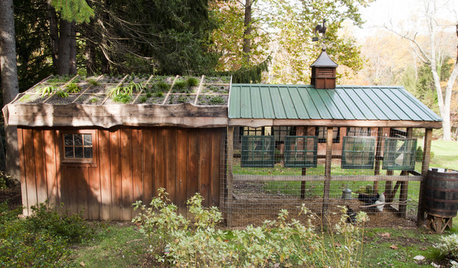diatomaceous earth
ancfan
14 years ago
Related Stories

GARDENING AND LANDSCAPINGBid Bad Garden Bugs Goodbye and Usher In the Good
Give ants their marching orders and send mosquitoes moseying, while creating a garden that draws pollinators and helpful eaters
Full Story
HOUSEPLANTSIndoor Winter Gardens for Cheerier Days
Bring plants inside for drab-days mood boosting — not to mention cleaner indoor air and protection for your greenery
Full Story
MOST POPULARHow to Get Rid of Those Pesky Summer Fruit Flies
Learn what fruit flies are, how to prevent them and how to get rid of them in your home
Full Story
GARDENING GUIDESOrganic Matters: Thwart Insect Pests With Trap Crops
Add a few sacrificial plants to your garden to lure insects away from the harvest
Full Story
GARDENING GUIDES10 Tips to Start a Garden — Can-Do Ideas for Beginners
Green up your landscape even if you're short on time, money and knowledge, with these manageable steps for first-time gardeners
Full Story
FARM YOUR YARDHouzz Call: Show Us Your One-of-a-Kind Chicken Coops
Do you have a fun or stylish backyard shelter for your feathered friends? Post your pictures and stories in the Comments!
Full Story
EDIBLE GARDENSGarden BFFs? Why Your Vegetables Are Begging for Companion Plants
Foster friendships among plants for protection from pests, pollination support and color camaraderie
Full Story
GARDENING GUIDESHow to Switch to an Organic Landscape Plan
Ditch the chemicals for a naturally beautiful lawn and garden, using living fertilizers and other nontoxic treatments
Full Story
EDIBLE GARDENSHow to Grow Your Own Sweet Summer Crops
This guide will help any gardener get started on growing the freshest warm-season veggies and berries for summer
Full Story
GARDENING AND LANDSCAPINGPorch Life: Banish the Bugs
Don't let insects be the bane of your sweet tea and swing time. These screening and product ideas will help keep bugs at bay on the porch
Full Story


marial1214
ania_ca
Related Discussions
Just got Diatomaceous Earth but there's 85% SO2 in it
Q
HELP! Diatomaceous Earth doesn't seem to be working on fleas
Q
Diatomaceous earth burning leaves??
Q
Diatomaceous Earth
Q
ancfanOriginal Author
ania_ca
l_james
ancfanOriginal Author
diclemeg
rhizo_1 (North AL) zone 7
diclemeg
vtguitargirl
marial1214
knittlin
rhizo_1 (North AL) zone 7
diclemeg
bejay9_10
marial1214
ljpother
jonas302
knittlin
l_james
knittlin
diclemeg
rhizo_1 (North AL) zone 7
ancfanOriginal Author
bejay9_10
knittlin
diclemeg
knittlin
wiringman
ania_ca
rhizo_1 (North AL) zone 7
leatherneckjoe